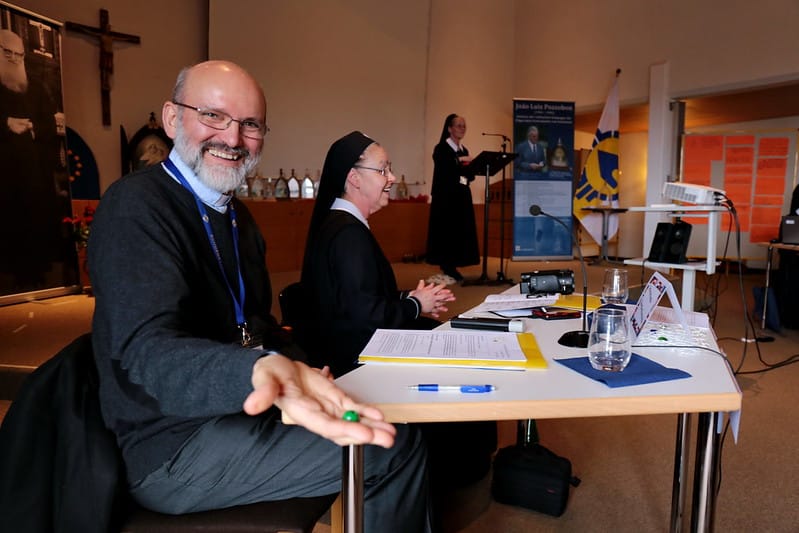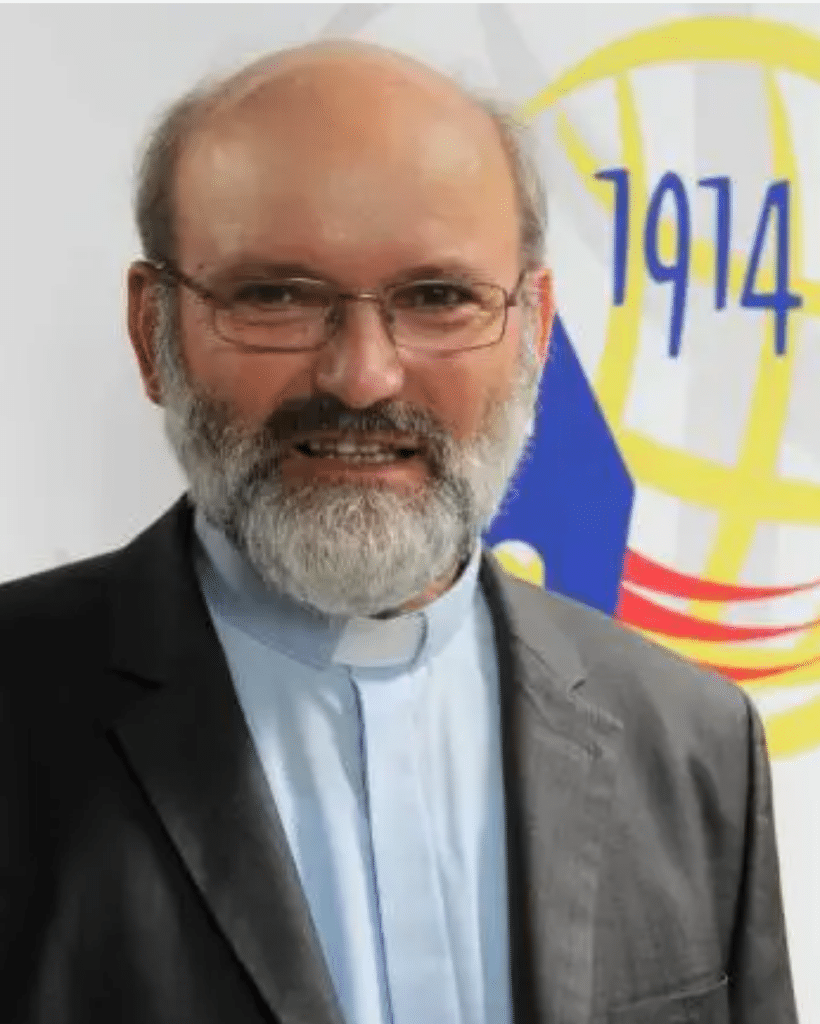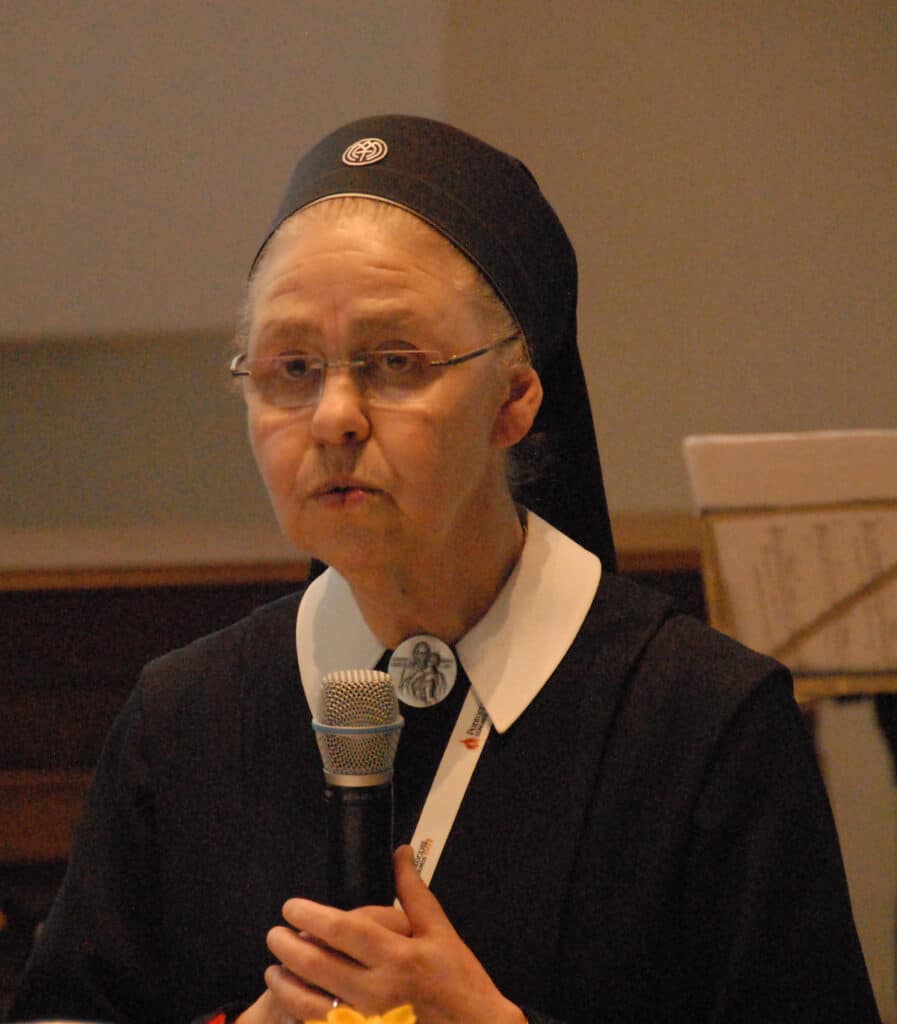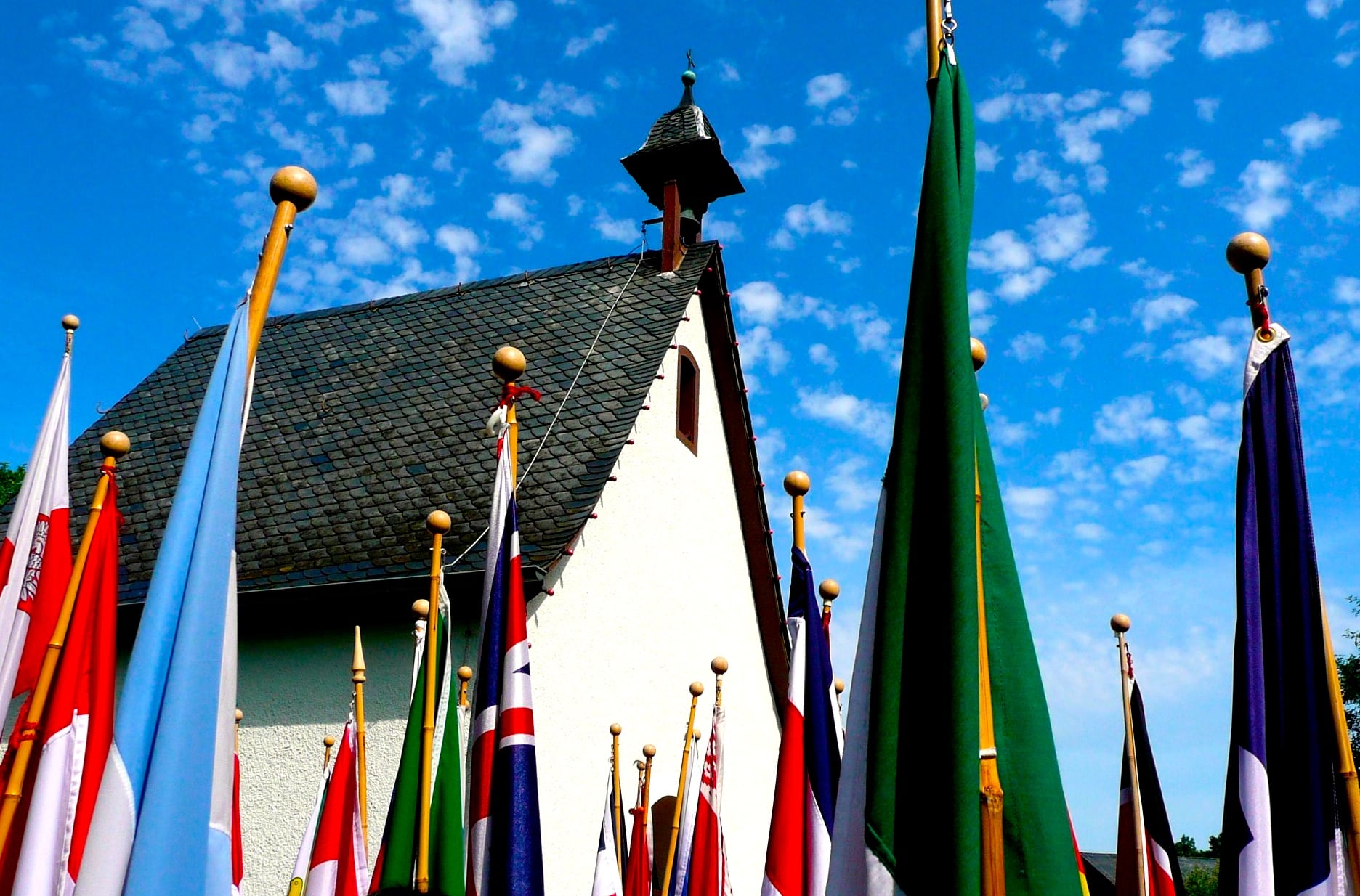Sister M. Cacilda Becker and Father Henrich Walter were interviewed by Sister M. Nilza to gather their experiences and ideas about the seven years in which they fulfilled the task of being the first International Coordinators of the Schoenstatt Movement. Since Schoenstatt is a federative movement, their mission has been to exercise the office they assumed: coordinators, at the service of Schoenstatt’s life in the different countries of the world. Father Walter now ceases this responsibility and goes to Austria, while Sister M. Cacilda remains for a period of three additional years. Father Arkadiusz Sosna from Poland, a member of the General Council of the Schoenstatt Fathers, will take over for the Schoenstatt Fathers.
You are the ones who launched the International Coordination Office of the Schoenstatt Movement. This takes courage and commitment. We are very grateful for all that you have done for the Movement.
What were your biggest challenges as International Coordinators?
Father Walter: We were each assigned 50% of this task. Sister M. Cacilda lived in Schoenstatt, and I lived in Rome. Since we had no other collaborators, it was like diving into cold water. We gradually worked out our task for the coming years, as described at the Pentecost Congress in 2015. At first, there were concerns in several countries that the International Coordination would interfere with the organization in the countries. Expectations about our work were very diverse. We had to do things our own way and at our own pace.

What has been your greatest joy during this time?
Father Walter: Experiencing the Movement in its diversity all over the world, getting to know it better, was the greatest joy for me. In some countries there is no active development, there is an aging of the Schoenstatt Family, which is being dealt with in different ways. On the other hand, it is flourishing in other regions, where Schoenstatt is in its beginnings with the enthusiasm of a founding generation. What they all have in common is the living charism. We can learn a lot from each other and inspire each other.
Sister M. Cacilda: For me the commitment of the volunteers has been and is a great source of enrichment. There are people from all continents, especially from Latin America, of all ages, especially young people, who have given their time, their skills, and their enthusiasm to the International Coordination to the extent of their abilities, and as something natural. We are very grateful for all the support, and I have constantly seen how people give of themselves out of love for the Blessed Mother and for Schoenstatt. Without them our work would not have been possible at all.
You represent the Movement from all over the world in the General Presidium. What is the purpose of this task?
Father Walter: In the Presidium there are two representatives from each of the Federations and Institutes of the Schoenstatt Movement. Until now, the communities of the League have been represented by the person responsible for the Movement in Germany. As the Movement became more international and larger in many countries, there was a stronger demand for a new order, since the national Movements did not feel sufficiently represented. How can the leader of the German Movement know what is happening in other countries and continents? This became especially visible around the 2014 Jubilee.
How would you describe the current reality of the International Schoenstatt Movement?
Sister M. Cacilda: Commitment and challenges. I experienced through many signs the greatness of the commitment of the Schoenstatters. It does not matter if there are many members of the Schoenstatt Family in a country or if there is a dwindling number; everyone does everything possible to keep a Shrine and a Schoenstatt center alive. Each one does what he or she can with joy and a sense of mission. And much of our Movement runs parallel to our work and with a great personal investment.
We have challenges in all aspects. The state of our society, with an increasing secularization in all areas of life, demands a lot of flexibility, being attentive to the changing times and having an open heart to grasp what is right. When I think of the challenges in some countries, I also think of the decrease in the number of Schoenstatters, the lack of leaders and people who can take Schoenstatt spirituality further in countries where the central Schoenstatt communities – the Federations and the Institutes – are not present….
How did you achieve representation in the Church, in the Vatican? What was the result?
Father Walter: Since I was stationed in Rome, I received most of the work. It is a long process to get noticed in the organisms of the global Church in Rome. It was a pleasant task because I was able to meet many people. It is incredible how many communities, movements, and initiatives there are in the universal Church. The Church is much more diverse, and the Holy Spirit is much more effective than we usually perceive. Of course, there are also tensions in this diversity. In these seven years we have advanced one step at a time. I spent most of my time cultivating relationships with people from various institutions of the universal Church and the Vatican. It was somewhat like lobbying for Schoenstatt. Unfortunately, the pandemic, with its restrictions, slowed down many initiatives.
How was the international Movement coordinated in the countries where it was already present? What was achieved there?
Father Walter: On the one hand, many things had already been accomplished in the last decades, especially through the Sisters and Fathers who have met on a worldwide and continental level to inform each other and coordinate some matters. For example, there are annual meetings of those responsible for the Movement at the continental level. During these years, the International Coordination has helped to articulate Schoenstatt’s participation in events of the worldwide Church, such as the World Youth Days, the World Family Days, the Holy Year and also the Synods of Bishops.

How have you accompanied the emergence of the Movement in new countries? In which countries have you worked in this sense?
Father Walter: We are still getting started. First, we responded to the requests and cries for help from the different countries, then we took a more general view of which countries were in need of action. It is surprising how many initiatives there are to introduce Schoenstatt in new countries. Frequently it is now lay people who do this missionary work due to invitations or through the open doors of Providence. We have to mention countries in Central America, then Eastern Europe and some attempts in new countries in Asia.
Sister M. Cacilda: Interestingly, people often write to us wanting to know if the Schoenstatt Movement exists in their country. The last inquiry was whether the Movement existed in Singapore. There were also inquiries from Indonesia, Japan and some other countries. In January 2022 a Pilgrim Mother was sent to Albania, and then another one five months later. She was received with great joy. In this country less than 5% of the inhabitants are Catholic, but the Blessed Mother is acting there now.
One of your tasks was and still is to create and maintain the official international website and social networks. What have you achieved in this area? What are the future projects?
Father Walter: It was very difficult at the beginning, first of all because of the world-wide communication issues in Schoenstatt. There are many who do a lot of things with the best of ideas and intentions, but it is not easy bringing everyone to the table for effective collaboration.
Sister M. Cacilda: We can say that communication is improving in general. We are in a second phase with the website. We are working to improve the content of the international website schoenstatt.com, involving people who bring the native linguistic feeling of their mother tongue to the translation, so that it is authentic to that language group. It would be even better if our own texts were written by native speakers. We try to take care of that as best we can, as well. Some articles are written by journalists who work 3 or 4 hours a week for us, but all this also involves a financial aspect. We are confident and hope to be able to raise what is needed. And, of course, we are very grateful for donations, without which we could not do this media work at all.
Another task is to participate in the life around the Original Shrine. How has this been accomplished?
Sister M. Cacilda: Yes, it is a very important and big project. As the coordinating office, we have launched some initiatives. For example, in April 2020, the worldwide crowning of the Blessed Mother – CoronaMater – was in the Original Shrine. During the pandemic, in 2021, we had the Week for the Original Shrine with a 12-hour marathon of contributions to raise awareness of the Original Shrine. Every year we work with a team for the celebrations on October 18, our founding day.

Over the years accusations have been made against our founder. How have you dealt with this? What concrete steps have been taken in relation to the Schoenstatt Family, the Church and society? What is the current situation?
Father Walter: At the beginning it was a matter of information and communication. The General Presidium appointed us as members of the Communications Commission, whose task was to maintain contact with the media on behalf of the Presidium and the preparation of publications. Regular virtual meetings were held, for example with the leaders of the Movement in the continents, to inform each other and suggest a common line of action. Our new website played a key role in this regard.
Sister M. Cacilda: The website was launched at the end of May 2020 and in early July accusations against our Founder appeared in the international press. So, it was a work of heavenly precision. We were able to act as the official organ of Schoenstatt International, we were able to publish the statements of the General Presidium and we were also able to serve as a point of contact for questions, comments and also expressions of solidarity.
What positive fruits has this brought for the Schoenstatt Family?
Father Walter: We have become more of a family. This confrontation has led to deeper dialogue and more effective collaboration between countries and communities. We have dealt more transparently with our history on the broad basis of the whole Movement. We have taken steps to reflect Father Kentenich’s charism in today’s context.
How would you rate the experience of these years? What do you take away from these years?
Father Walter: With regard to the universal Church, Schoenstatt’s voice is important. In terms of content and personally, Schoenstatt needs a face that can be perceived everywhere – with all its local autonomy. We are just starting. The International Coordination team needs to grow so that the service for the whole Movement can be expanded.
Sister Cacilda: I see these years as the start of a very big project. The pandemic has hindered many things on the one hand, but on the other hand it has also made many things possible and has taught us a lot. We have become much more connected through networking. This has allowed us to quickly learn more from the different countries and be able to provide help in a timely manner. I would say that the foundation stone of our work has been laid. Thanks to the long preparation for the Pentecost Congress – which was also a consequence of the pandemic – we were able to establish many contacts.
In addition to the experiences of these 7 years, in which everything started from scratch, I am taking with me, above all, the joy of our international Schoenstatt Family and the gratitude to all those who have helped us during these years.
What tasks are you currently assuming?
Father Walter: In mid-May I will move to Vienna and work as a collaborator for the Austrian Movement Headquarters. This will mean above all pastoral work with families in Austria.
On the future of the International Coordination of the Movement

At its last meeting, the General Presidium determined who will continue with the International Schoenstatt Coordination for the next three years, that is, until 2026.Sister M. Cacilda Becker, a Brazilian, who speaks Portuguese, German and Spanish, will continue with this task for another term.
Father Arkadiusz Sosna, from Poland, a member of the General Council of the Schoenstatt Fathers, was elected from among the Fathers, and speaks Polish, German and Spanish.
Both live in Schoenstatt.

